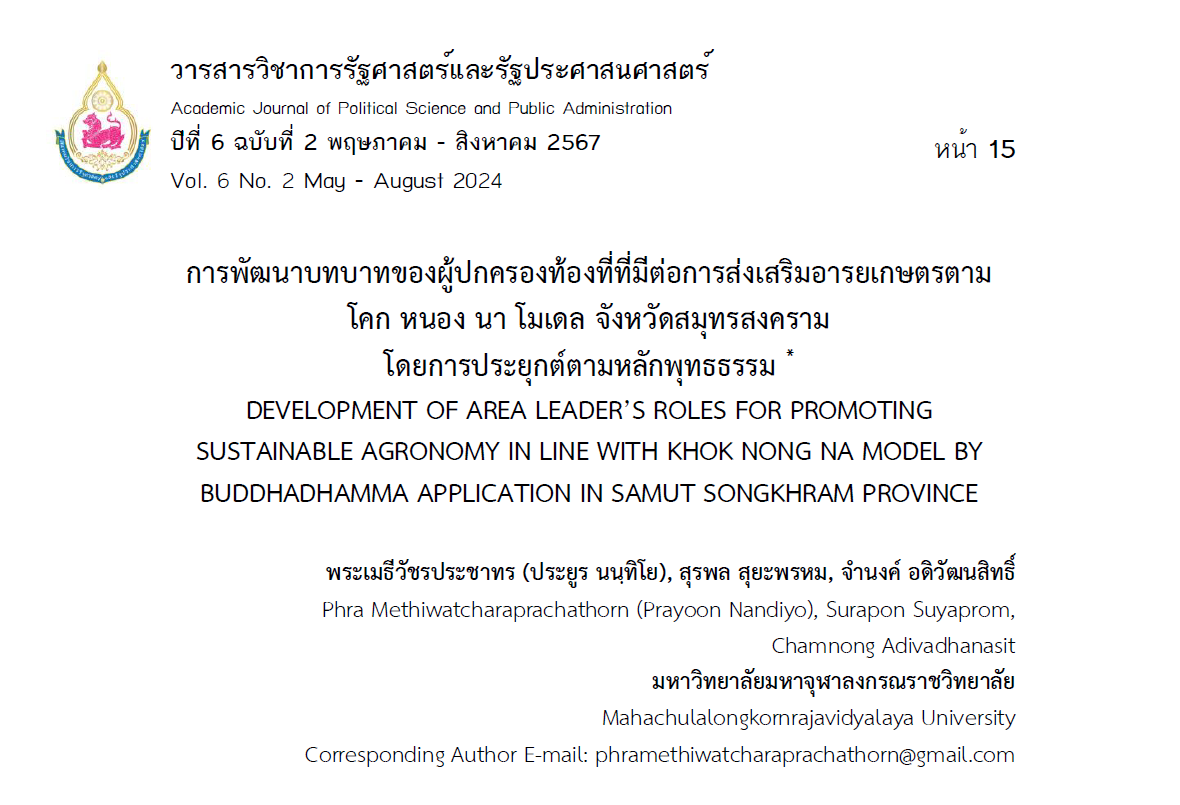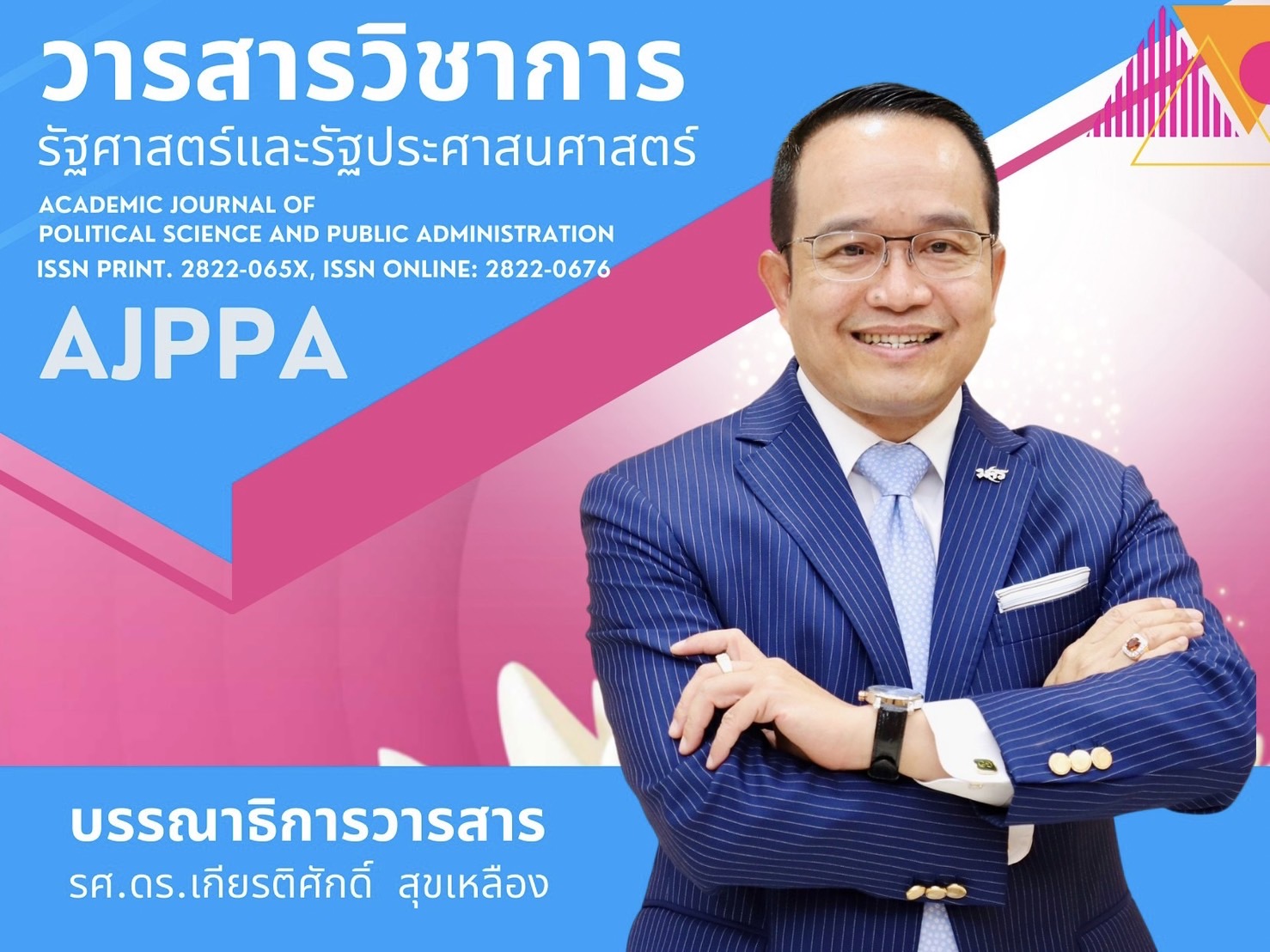การพัฒนาบทบาทของผู้ปกครองท้องที่ที่มีต่อการส่งเสริมอารยเกษตรตาม โคก หนอง นา โมเดล จังหวัดสมุทรสงคราม โดยการประยุกต์ตามหลักพุทธธรรม
คำสำคัญ:
การส่งเสริมอารยเกษตร, โคก หนอง นา โมเดล, ผู้ปกครองท้องที่บทคัดย่อ
บทความวิจัยครั้งนี้มีวัตถุประสงค์เพื่อพัฒนาบทบาทของผู้ปกครองท้องที่ที่มีต่อการส่งเสริมอารยเกษตรตาม โคก หนอง นา โมเดล จังหวัดสมุทรสงคราม โดยการประยุกต์ตามหลักพุทธธรรม เป็นการวิจัยเชิงคุณภาพ เก็บข้อมูลภาคสนามจากผู้ให้ข้อมูลสำคัญ 5 กลุ่ม ด้วยการเลือกแบบเจาะจงตามลักษณะการเป็นตัวแทนของกลุ่มที่เหมาะสม จำนวน 25 รูปหรือคน ได้ใช้แบบสัมภาษณ์แบบกึ่งโครงสร้าง เป็นเครื่องมือในการเก็บรวบรวมข้อมูล โดยวิเคราะห์ข้อมูลด้วยเทคนิคการวิเคราะห์เนื้อหาประกอบบริบท และการสนทนากลุ่มเฉพาะผู้ทรงคุณวุฒิ จำนวน 10 รูปหรือคน โดยวิเคราะห์ข้อมูลด้วยเทคนิคการวิเคราะห์เนื้อหาประกอบบริบท
ผลการวิจัยพบว่า การพัฒนาบทบาทของผู้ปกครองท้องที่ที่มีต่อการส่งเสริมอารยเกษตรตาม โคก หนอง นา โมเดล จังหวัดสมุทรสงคราม โดยการประยุกต์ตามหลักพุทธธรรม ด้านบทบาทในการสร้างความรู้ ประกอบด้วย 1. ผู้ปกครองท้องที่ให้ความรู้อย่างเต็มที่และเต็มใจ 2. ผู้ปกครองท้องที่มีการสร้างความเชื่อมั่นและความไว้วางใจให้กับประชาชน 3. การหมั่นตริตรองพิจารณาช่วยให้ผู้ปกครองท้องที่เป็นผู้ที่มีความรู้และเข้าใจถึงผลกระทบที่อาจเกิดขึ้นจากการให้ความรู้ 4. ผู้ปกครองควรสำรวจและวิเคราะห์เหตุผลที่เป็นหลักในการให้ความรู้ ด้านบทบาทในการสร้างแนวทางการพัฒนา พบว่า 1. เต็มใจและตั้งใจในการพัฒนาโครงสร้างพื้นฐาน ได้แก่ การเตรียมพื้นที่และเสริมสร้างโครงสร้างพื้นฐานที่จำเป็น รวมถึงการสร้างความร่วมมือและพันธมิตร 2. เพียรพยายามในการบริหารจัดการและดูแลรักษาทรัพยากร 3. เอาใจใส่ในการพัฒนา การดูแลและสนับสนุน ส่งเสริมการเผยแพร่และการแลกเปลี่ยนความรู้ การสร้างการสื่อสารและการสร้างความตระหนัก 4. หมั่นทบทวน ปรับปรุงแก้ไข ประเมินผลและปรับปรุง ด้านบทบาทในการสร้างแนวทางปฏิบัติ 1. ให้ความสำคัญกับการศึกษาและพัฒนาองค์ความรู้ให้แก่เกษตรกรอย่างเต็มใจ 2. พัฒนาทรัพยากรให้มีคุณภาพอย่างต่อเนื่อง 3. มีความรับผิดชอบสูง และมีความสามารถในการพัฒนานวัตกรรมที่นำไปสู่ความยั่งยืน 4. เข้าใจปัญหา ร่วมคิด ร่วมแก้ไข ร่วมวางแผนปรับปรุง
เอกสารอ้างอิง
ชุติพนธ์ วงษ์อมรวิทย์. (2564). การเสริมสร้างจริยธรรมทางการเมืองของนักการเมืองท้องถิ่นในจังหวัดนครราชสีมา (ดุษฎีนิพนธ์ปรัชญาดุษฎีบัณฑิต สาขาวิชารัฐศาสตร์). พระนครศรีอยุธยา: มหาวิทยาลัยมหาจุฬาลงกรณราชวิทยาลัย.
ณฐมน หมวกฉิม. (2564). การตื่นตัวทางการเมืองของเยาวชนในระบอบประชาธิปไตยที่มีผลต่อการเลือกตั้งทั่วไปของไทย (ดุษฎีนิพนธ์ปรัชญาดุษฎีบัณฑิต สาขาวิชารัฐศาสตร์). พระนครศรีอยุธยา: มหาวิทยาลัยมหาจุฬาลงกรณราชวิทยาลัย.
ภูริวัจน์ ปุณยวุฒิปรีดา. (2564). การพัฒนากลไกการกำหนดนโยบายของพรรคการเมืองไทย (ดุษฎีนิพนธ์ปรัชญาดุษฎีบัณฑิต สาขาวิชารัฐศาสตร์). พระนครศรีอยุธยา: มหาวิทยาลัยมหาจุฬาลงกรณราชวิทยาลัย.
มติชนออนไลน์. (2565). อธิบดี พช. นำคณะเยือนแม่กลอง ลงพื้นที่ต้นแบบ โคก หนอง นา พช. ตามหลักทฤษฎีใหม่. สืบค้น 2 มีนาคม 2565, จาก https://www.matichon.co.th/news-monitor/news_2687663
สถาบันพระปกเกล้า. (2554). บูรณาการงานวิจัย นักการเมืองถิ่นและพฤติกรรมการเลือกตั้ง 2550. กรุงเทพฯ: สถาบันพระปกเกล้า.
สำนักเสริมสร้างความเข้มแข็งชุมชน กรมการพัฒนาชุมชน กระทรวงมหาดไทย. (2564). แนวทางการดำเนินงาน ศูนย์เรียนรู้ โคก หนอง นา พัฒนาชุมชน. กรุงเทพฯ: กรมการพัฒนาชุมชน.
สุมาลี บุญเรือง. (2564). การพัฒนาการตื่นตัวทางการเมืองของประชาชนในระบอบประชาธิปไตยที่มีผลต่อการเลือกตั้งทั่วไป (ดุษฎีนิพนธ์ปริญญาปรัชญาดุษฎีบัณฑิต สาขาวิชารัฐศาสตร์). พระนครศรีอยุธยา: มหาวิทยาลัยมหาจุฬาลงกรณราชวิทยาลัย.

ดาวน์โหลด
เผยแพร่แล้ว
รูปแบบการอ้างอิง
ฉบับ
ประเภทบทความ
หมวดหมู่
สัญญาอนุญาต
ลิขสิทธิ์ (c) 2024 วารสารวิชาการรัฐศาสตร์และรัฐประศาสนศาสตร์

อนุญาตภายใต้เงื่อนไข Creative Commons Attribution-NonCommercial-NoDerivatives 4.0 International License.




